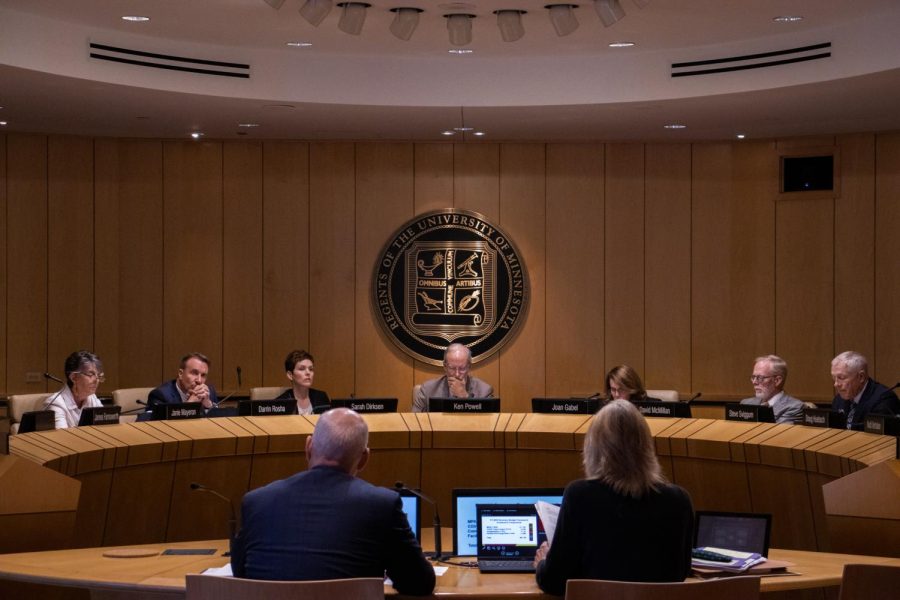The University of Minnesota Board of Regents met Wednesday for their first meeting of the 2021-22 academic year. They discussed several important issues and updates, such as the Twin Cities campus master plan and the search for a new chief auditor.
The board also discussed Gov. Tim Walz’s June 26 higher education bill, which gave the University $38.5 million in funding. The bill was 82% of the funding the board requested, University President Joan Gabel said.
The bill also expanded eligibility for low and middle-income families to receive state grants, especially those not eligible for the Pell Grant, Gabel said.
Twin Cities campus master plan update
The University’s Senior Vice President for Finance and Operations Myron Frans also provided an update and sought insight from the board on the University’s campus master plan. The plan outlines the physical development of the Twin Cities campus and will address questions of growth, capital renewal and interactions with the community, Frans said.
“The campus plan acts as a guide for us to invest in our campus,” Frans said at the meeting. “Perhaps the most important of all is that it establishes a vision for the future in the near-term and long-term.”
Some of the big ideas within the plan include creating a more inclusive environment, enriching the student experience and increasing accessibility by rethinking the campus’ physical environment.
For example, buildings like Peik Hall are identified for demolition to provide more green space on campus, said Greg Havens, the principal planner from Sasaki, the outside firm working with the University to develop the master plan.
The plan focuses on enhancing the University’s status as a leader across Minnesota and will look for opportunities to provide new academic and research facilities, as well as new on-campus housing sites, Havens said.
Several regents raised concerns about the opportunities for student housing. Regent Darrin Rosha said increasing student housing is an immediate concern and should be addressed before other goals, such as developing more research facilities.
“Finding an opportunity to advance student housing immediately is really [critical] … as I look at this, a lot of this is out in the future,” Rosha said at the meeting.
Regent James Farnsworth and Regent Dave McMillan also raised concerns about the lack of affordable student housing available through the University.
“Yes, the private sector has made great investments … but there’s a severe concern among students about affordable housing,” Farnsworth said at the meeting.
Recommendations for the plan will come before the board for final action in December.
Establishing a search committee for new chief auditor
Gail Klatt will be leaving her position as chief auditor for the University, a role she has held for more than 25 years. With Klatt’s leave, the board will have to choose a new chief auditor for the first time in nearly three decades.
“She’s known for being an honest and dedicated colleague,” Gabel said at the meeting.
An auditor reviews and verifies the accuracy of the University’s financial records, ensures compliance with tax laws and protects from fraud. For example, the University’s Office of Internal Audits verified that funds from the CARES Act were distributed to students in compliance with federal guidelines last year.
The board approved the composition of the search committee in charge of finding the next chief auditor on Wednesday. This committee will advise the board as they choose the next chief auditor, said Brian Steeves, the board’s executive director and secretary at the meeting.
The committee has 11 members, three regents and eight senior University leaders with special knowledge and expertise for this search, Steeves said. The three regents on the committee will be Regents Mary Davenport, Mike Kenyanya and Steve Sviggum, who will chair the committee.
Once the board has narrowed down finalists, they will ask student government organizations across the system for their input before selecting the next chief auditor, Steeves said.
“The charge of this committee is extremely, extremely important,” Sviggum said at the meeting. “Our goal will be to find someone so the committee does not have to be formed for another 27 years.”


















